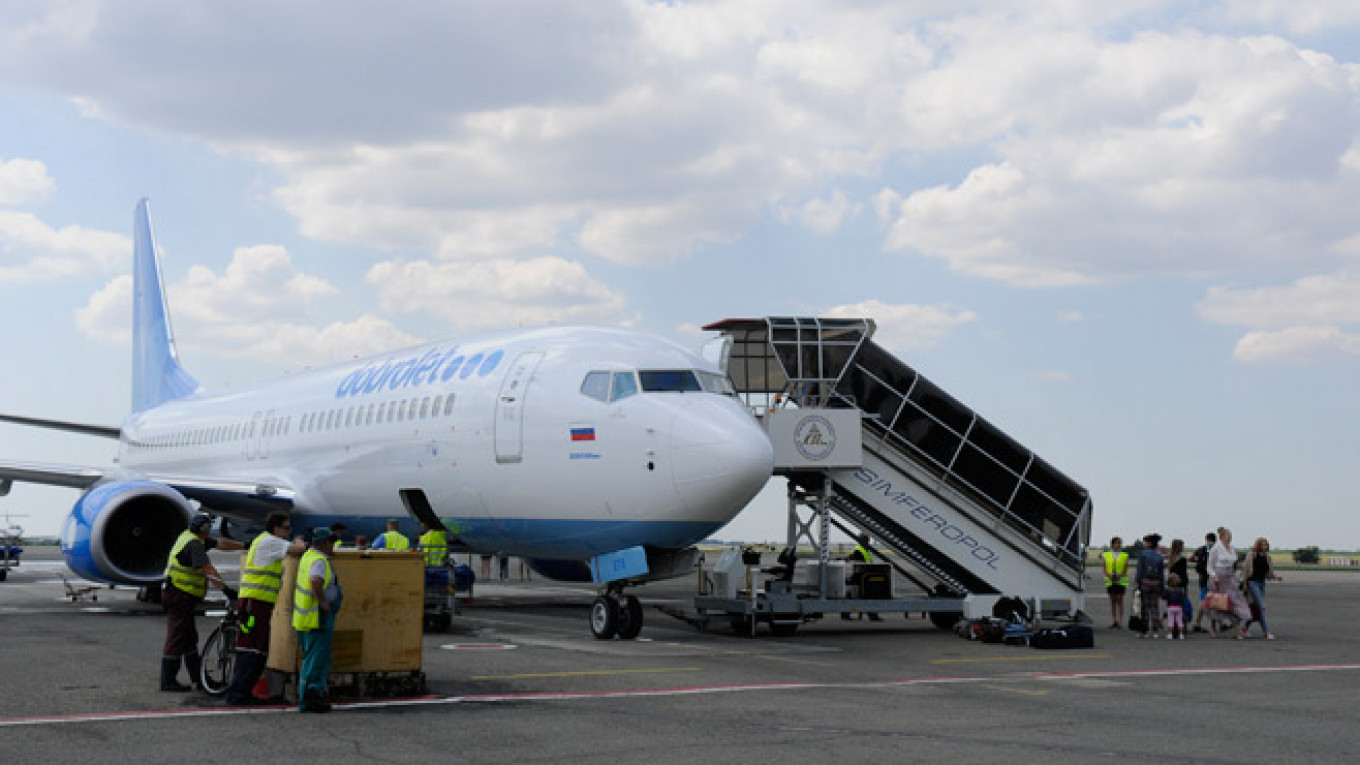The grounding this week of Russia's low-cost airline, Dobrolyot, by European Union sanctions has exposed the vulnerability of Russia's airline industry, which relies on aircraft leased from abroad that can be withdrawn at the push of a pen in Brussels or Washington.
Russian airlines lease 90 percent of their planes from international leasers, meaning any carrier to be blacklisted could lose most of its fleet overnight. Removing that dependence would take time, cost money and likely see Western leasing companies lose out to Asian competitors, industry experts said. As a result, air travel in Russia — already notoriously expensive — could become even less affordable.
"Because of their better fuel economy, most aircraft in the fleets of Russian airlines are Western-made … and these planes are leased by American and European leasing companies," said Andrei Rozhkov, a transport analyst at investment company Metropol. "Technically speaking, all these airlines could be targeted with the same sanctions [as Dobrolyot]," he said.
Dobrolyot, a subsidiary of Aeroflot that began flying in June, was blacklisted by the EU last week for flying to Crimea, the annexation of which by Russia in March sparked outrage in the West.
On Sunday, the company suspended all flights after its leasing contract with Ireland's AWAS for its Boeing-737-800 aircraft was annulled. Lufthansa Technik, the German company that serviced Dobrolyot's planes, also refused to deal with the company.
Dobrolyot said Wednesday it had placed a deposit to buy 16 Boeing 737-800 planes directly from the plane maker, which is not subject to EU sanctions, Interfax reported. The first planes are scheduled to arrive in 2017.
Most of Russia's major airlines fly to Crimea. Aeroflot, S7 Airlines, Uralskiye Avialinii and Red Wings offer regular flights.
Only Red Wings is insulated, as it flies Russian-made Tu-204-100 planes. All other airlines operate either Boeing or Airbus planes acquired through operational leasing.
The airlines could not provide immediate comment on whether any efforts were made to ward off possible difficulties with their leasing companies.
Emergency Exits
Risk managers in Russia have already been scrambled, according to Oleg Panteleyev, head of AviaPort information agency, with the government assessing the risks as early as April.
"A way out would be to create a special airline servicing only flights to and from Crimea that would only employ Russian-made planes," Panteleyev said, adding that such an airline could launch by the end of this tourist season.
Another option, Panteleev said, would be to switch to Russian or Chinese leasing providers. But this would be much more time consuming and would not remove all risks, he said — there is no guarantee that Chinese companies will be keen to rile Western regulators by flouting sanctions.
Metropol's Rozhkov said that turning for help to Asia will also be expensive.
"There rates of Chinese leasing companies would be higher than the ones offered by Western companies. As for Russian leasing companies, they mostly lease domestic-made airplanes," Rozhkov said. And with the Russian economy on the edge of recession and access to international capital markets under pressure from sanctions, Russian leasers are in no position to quickly add fleets of airplanes to their balance sheets.
That increase in costs would inevitably be shouldered by consumers, who already pay over the odds in a country that covers 12 time zones but has no budget airline.
However, the threat may never materialize. Western sanctions against major airlines would cause huge disruption to air travel while stripping European and American leasing companies of revenues, Rozhkov said.
Looking to Asia
But Asian leasers may still get a boost as both Western and Russian companies move to hedge risks.
On Tuesday, Hong Kong-based Cheung Kong Holdings offered to buy part of AWAS's airline fleet, ITAR-Tass reported. One of the world's biggest aircraft leasers, AWAS's customers include Aeroflot and S7 Airlines, two of Russia's largest carriers.
Meanwhile, Russia has made it clear that has like-for-like sanctions up its sleeve.
On Tuesday, Vedomosti reported that Russian authorities may restrict or ban European airlines from flying over Siberia on Asian routes, increasing the distances and costs, while handing an advantage to Asian carriers.
One source told the paper that the move would cost Lufthansa, British Airways and Air France 1 billion euros ($1.3 billion) over three months.
See also:
Capitalization of U.S., EU Airlines Falls $4.5 Billion on Russian Threats to Close Airspace
Contact the author at [email protected]
A Message from The Moscow Times:
Dear readers,
We are facing unprecedented challenges. Russia's Prosecutor General's Office has designated The Moscow Times as an "undesirable" organization, criminalizing our work and putting our staff at risk of prosecution. This follows our earlier unjust labeling as a "foreign agent."
These actions are direct attempts to silence independent journalism in Russia. The authorities claim our work "discredits the decisions of the Russian leadership." We see things differently: we strive to provide accurate, unbiased reporting on Russia.
We, the journalists of The Moscow Times, refuse to be silenced. But to continue our work, we need your help.
Your support, no matter how small, makes a world of difference. If you can, please support us monthly starting from just $2. It's quick to set up, and every contribution makes a significant impact.
By supporting The Moscow Times, you're defending open, independent journalism in the face of repression. Thank you for standing with us.
Remind me later.






